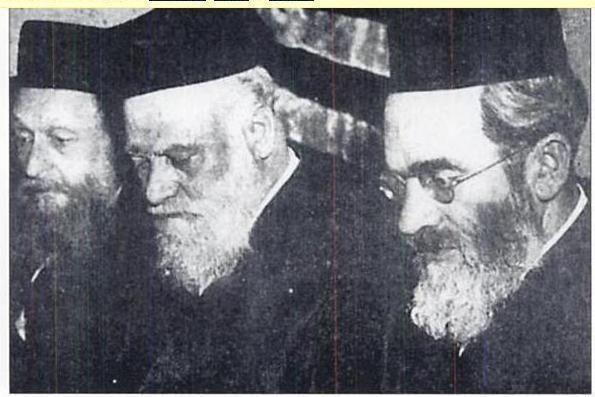
For inspiration over the high holidays, Rabbi Hyim Shafner of Kesher Israel Congregation is reaching back a century to the writings of his predecessor, Rabbi Gedalia Silverstone, the first rabbi at the Georgetown synagogue.
“He has a deep love of the Jewish people, which comes through [in his writings]. He has a great intellect, a great sense of humor, but he also realizes what the problems are. He rebukes the people when they need it,” Shafner said. “That sense of being both strongly observant, encouraging study of the Torah and observance, and yet being really in touch with the people and where they’re at, and being part of the community and seeing different points of view, are really important messages for us today.”
Shafner is teaching a three-part series on Silverstone and the early 20th century Orthodox community he ministered and belonged to.
“There are two aims: The first is for us to prepare for the high holidays, to hear his words, but also to have a window on the Jewish history of Washington, and what it was like,” Shafner said.
A native of Eastern Europe, Silverstone came to America from Ireland, where he was the rabbi of the Belfast Hebrew Congregation, to sell his books. In 1906, he was appointed rabbi of the Ohev Sholom Congregation in the District, and in 1911, he also began serving as the first rabbi at Kesher Israel.
Shafner said Silverstone wrote and published 40 books in Hebrew, about half of which are books of his sermons, the rest being books on Jewish ethics, the Talmud and other subjects.
“You get a snapshot of Washington, especially Orthodox life in Washington, and Jewish life generally, in the early part of the 20th century. It’s like opening a time capsule,” Shafner said.
In 1910, Silverstone gave one of his Hebrew books as a gift to President William Howard Taft, and received a letter in return.
“The letter back is from the personal secretary of the president — it was a political position, like his chief of staff — Charles Dyer Norton,” Shafner said.
Shafner said there was no formal Jewish education in Washington at the time, and Silverstone bemoaned the state of observant Judaism in the capital.
“He says at one point, when the people sit shivah, they come to him on Friday and say, ‘We know we’re not allowed to sit shivah on Saturday, so can we go to work?’” Shafner said. “He talks about how people are not bringing their children to services, they’re bringing them to work on Saturdays.”
Shafner said he looked for Silverstone’s writings on the 1918 influenza pandemic to see how they might relate to the current pandemic. But Silverstone’s published works speak very little about it, which Shafner believes was due to pressure from the Woodrow Wilson administration on journalists and media not to report anything negative about the pandemic.
“I found one thing about the pandemic, from 1920, after the pandemic. He writes about how last year, we couldn’t be in the synagogue, all the synagogues were closed, and so this year we have to really rend our hearts,” Shafner said.
Shafner said one of the things about Silverstone that readers today can learn from was his open-mindedness.
“He doesn’t get bogged down in one way of thinking. At first he says, ‘Israel is the answer. We should all go to Israel.’ Then he goes to Israel and he realizes there is a lot of secularism in Israel, and he changes his mind. He’s willing to embrace his own inner conflict and he’s willing to embrace different ways of looking at things, whether it’s Israel, or the Jewish community in Washington.”
Shafner said he first encountered Rabbi Silverstone while rabbi of a synagogue in St. Louis, a week after he accepted the position of rabbi at Kesher Israel.
“I looked on one of the shelves there, and it was a book on Perkei Avot — the Ethics of the Fathers. It was called “Lev Avot” — the heart of our fathers — and I was intrigued by it. I opened the cover and it said it was by a rabbi, Gedalia Silverstone … the rabbi of Washington, the capital city. I thought this is really weird … I’d never seen this book before, never heard of him, and just after I accept the job in Washington and here’s this book of his from 100 years ago,” Shafner said.
Shafner began investigating Silverstone online, and began researching his life and writings.
“He was very well respected, a great scholar, and somebody who both wants to inspire the Jews of Washington, not just in his synagogue, but in the community generally, but also realizes how difficult especially observant life is in America at that moment,” Shafner said. “I find it really inspiring to connect back to the first rabbi at Kesher Israel.”






